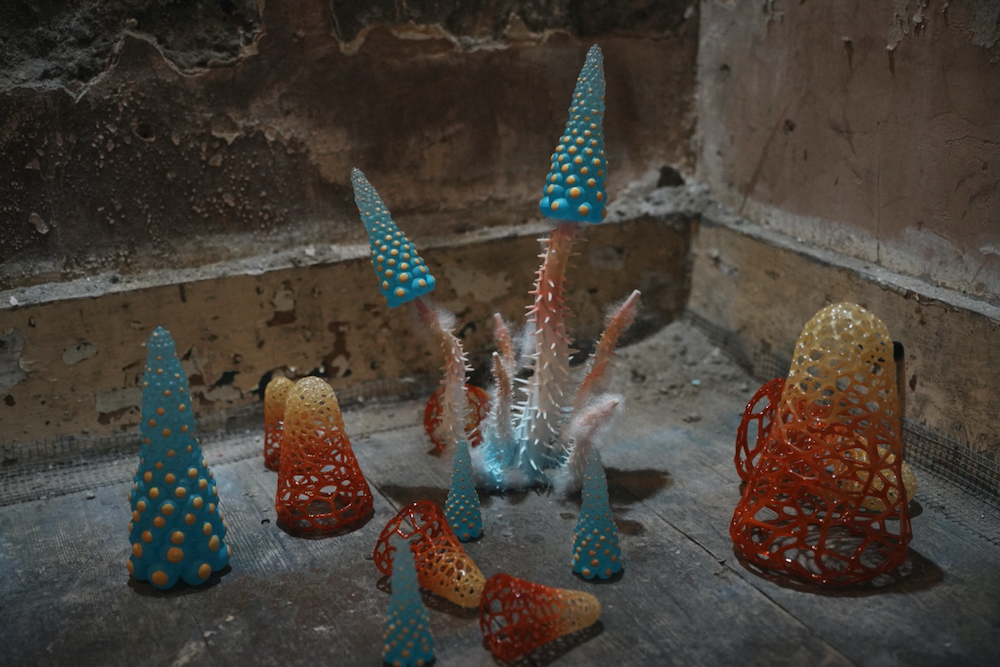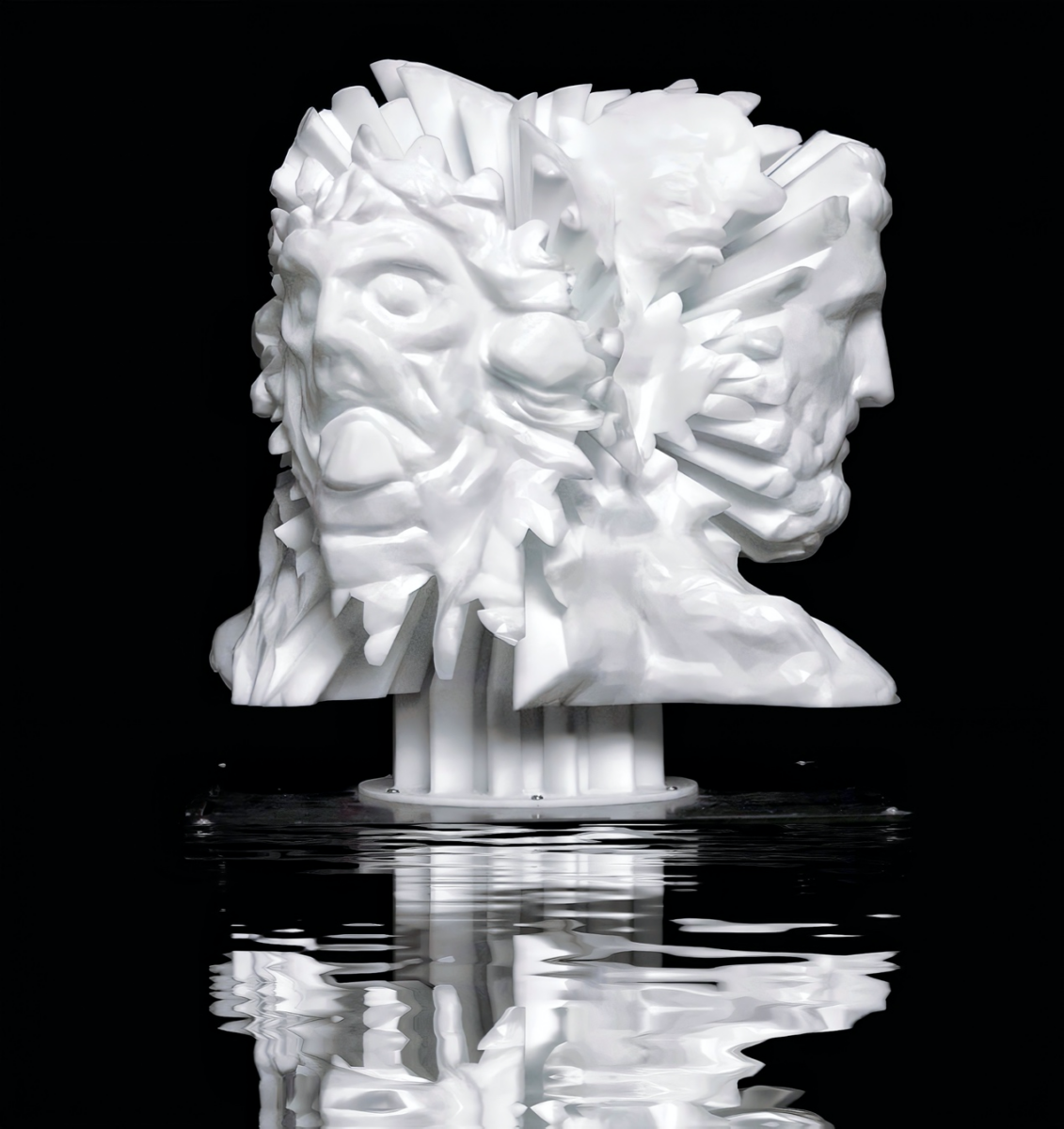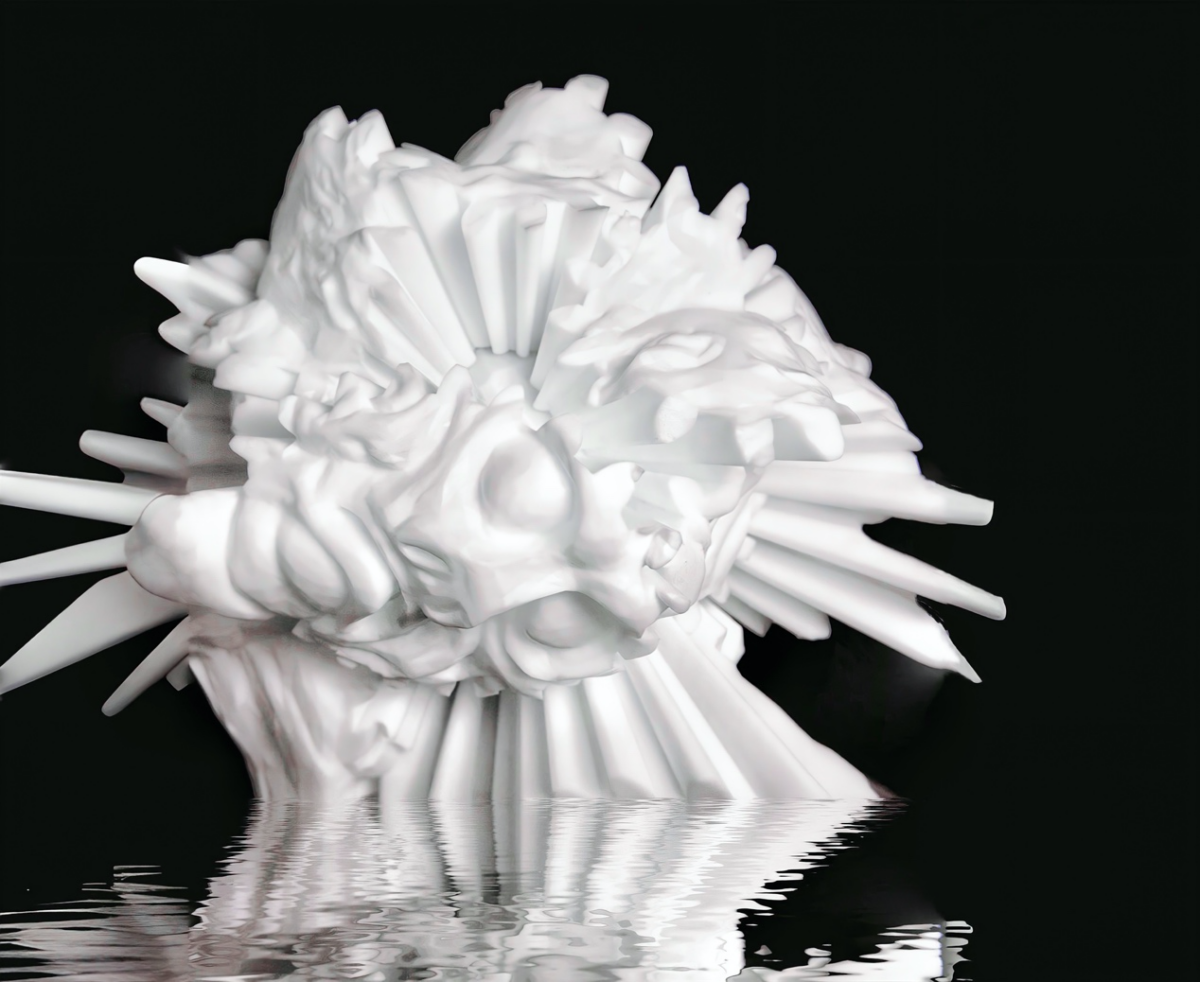

Visual artist Yiru Wang’s Elysium Echoes premiered at the 2024 London Design Festival as a thought-provoking examination of the intricate and often fragile relationship between environmental change and human survival in an era defined by post-humanism. Yiru’s new series of 3D-printed installations explores the interplay between technological progress and ecological sustainability, raising critical questions about the trajectory of human evolution amid the influences of artificial intelligence, industrial production, and environmental collapse.
The series centers on the delicate balance between the environment, productivity, and biological evolution. Yiru underscores the notion that as humans advance technologically, their connection to the natural world becomes increasingly tenuous, placing ecological sustainability at risk. This tension lies at the heart of Elysium Echoes: Can technological advancement coexist with the environment, or does it inherently destabilize the natural systems that have governed human evolution for millennia?
Technological Progress vs. Ecological Collapse: A Precarious Balance
The series invites us to reflect on how technology-driven productivity has enabled humans to dominate and reshape their surroundings. Over millennia, these advancements have accelerated human evolution, allowing for adaptation to diverse climates, the overcoming of natural barriers, and the thriving of societies in once-hostile environments. In this sense, technology acts as a buffer against environmental pressures, delaying or deflecting the forces that drive natural selection and adaptation.
However, Yiru critiques this dynamic, particularly when rapid or extreme environmental changes disrupt ecosystems at an unprecedented pace. As her work suggests, once seemingly unshakable technological structures can collapse under the weight of environmental catastrophe. In such scenarios, the resilience of human productivity is severely tested, revealing the fragility of the systems we depend on. Elysium Echoes paints a stark picture of how, under extreme pressure, technological supports crumble, allowing nature to reassert its dominance. In these moments, human survival may again depend more on genetic adaptation than technological innovation.
Kinetic Devices and Symbiotic Species: Evolution in Flux
One of the central installations in Elysium Echoes, titled Symbiotic Species: Human Responses from a Decentralized Perspective, is a kinetic sculpture symbolizing the evolution of biological diversity and the fluid boundary between humans and post-humans. Through dynamic motion, Yiru highlights the cyclical and ever-changing nature of biological evolution, where species continuously adapt, merge, and transform into new forms.
The rotating installation, composed of human, transitional biological forms, and post-human elements, encapsulates the fluidity of evolution in the post-human era. As the sculpture spins, the once-distinct boundaries between species dissolve, symbolizing the shift from familiar biological forms to speculative ones that challenge traditional conceptions of humanity. Yiru masterfully combines technology and art, employing 3D printing and power-driven devices to create an immersive experience. Classical portrait models are deconstructed into post-human entities, provoking a sensory impact through the dual dimensions of technology and imagery. With each rotation, the future form of the species remains unpredictable, embodying the uncertainty of genetic evolution influenced by both technology and natural selection.
The installation evokes a sense of ongoing transformation, blurring the lines between humans and post-humans. Yiru suggests that evolution—shaped by both environmental pressures and technological intervention—will give rise to entirely new forms of life. By challenging traditional biological boundaries, she encourages viewers to question what it means to be human in an era where genetic manipulation, artificial intelligence, and biotechnology are redefining the limits of evolution.


Critiquing Technological Hubris: An Ethical and Existential Dilemma
While Elysium Echoes engages with post-humanism and evolution on a theoretical level, its most profound contribution is its ethical and philosophical critique of humanity’s role as the “creator” in this new epoch. Yiru poses a crucial question: Is it ethical—or wise—for humanity to assume the role of a godlike figure, shaping and controlling nature through technology? In her portrayal of a future that feels like “echoes from Elysium,” Yiru offers a cautionary message: this hubristic attempt to replace the Creator may not unfold as envisioned.
In today’s technology-driven world, where human influence on the environment is often justified as progress, Yiru calls for a reassessment of the cost of such power. While technological innovation has brought unprecedented improvements in human health, productivity, and life expectancy, it has also exacerbated an environmental crisis, accelerating deforestation, climate change, mass extinctions, and ecosystem collapse. Her work critiques this paradox: the same advancements that have extended human life may also be hastening our demise.
Post-Human Futures: A Cautionary Tale?
A central question Yiru raises is the uncertain future of the post-human era. While technological optimists celebrate the potential for humanity to transcend its biological limitations, she offers a more skeptical perspective. The post-human future envisioned in Elysium Echoes is rife with contradictions: on one hand, the promise of extraordinary technological achievements; on the other, the threat of environmental collapse, genetic mutation, and a dystopian world where humans are no longer the dominant species.
Yiru’s work does more than speculate on a post-human future—it interrogates the ethical implications of humanity’s current path. In our pursuit of mastery over nature and the extension of human life, we may be overlooking the costs of this progress. Ultimately, it may not be humanity that controls its destiny, but the environment—shaping and selecting future life forms in ways that are beyond our comprehension.
Conclusion: An Artistic Call for Reflection
In Elysium Echoes, Yiru Wang offers a profound and multifaceted exploration of human evolution, environmental pressure, and technological intervention. Her work is both a reflection on the future and a critique of the present. By deconstructing the relationship between humanity and the natural world, Yiru encourages viewers to question the ethical and existential ramifications of reshaping nature in the name of progress. In an era where technology seems poised to redefine humanity, she presents a cautionary tale: the environment is not a passive backdrop but an active force of change.
As humanity continues its technological advance, we must ask ourselves: Are we prepared for the consequences of our actions? Are we truly the masters of our own evolutionary destiny? Elysium Echoes suggests that, in the end, it may be the echoes of the environment that determine the future of life on Earth, not the hands of technological intervention.
This version maintains the original meaning and content while enhancing clarity, flow, and grammatical accuracy.








